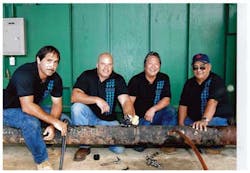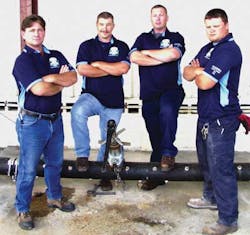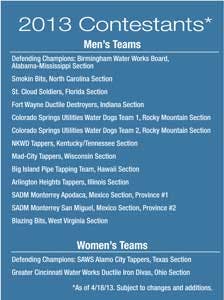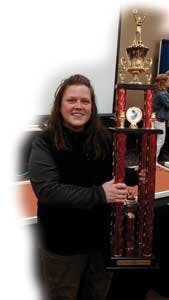Friendly Competition: Teams tap into the rewards of working hard and playing harder
Walking the exhibition floor at AWWA's annual national event, you hear and see the excitement. Massive pieces of equipment whirr and spin; booth displays - large and small - compel your attention. There are magic shows, card tricks and displays of pool-playing prowess, adding an element of fun to the more serious business of finding that new piece of technology that will make your utility that much more efficient.
But from somewhere in the back, you hear something else. A cheer goes up! Whooping and hollering echo throughout the hall. It's the unmistakable sound of an enthusiastic crowd captivated by the spirit of a good competition.
Anyone who's been to the national event and followed their ears to the back of the hall knows what I'm talking about. The pipe-tapping competition has become one of the most popular and entertaining attractions at the show.
For anyone unfamiliar with the contest, it's a test of strength, skill, and speed. Teams of four (three utility staff members and one coach) from around the country compete to see who can install a tap into a cement-lined, ductile iron pipe the fastest. Mistakes - such as crimps, leaks, or safety violations - are penalized in the form of seconds added to the team's total time (alliteration aside).
Each team has two opportunities to complete a tap, of which the best time is its official time for the event. The winner gets a trophy and a chance to return the following year, on AWWA's dime, to defend its title. And, of course, the winner also gets bragging rights.
But competing isn't just about being deemed best of the best. Turns out there are a whole host of side benefits that result from participating in the games.
Robert Powell, a utilities supervisor at Colorado Springs Utilities (CSU) has seen this firsthand. "Every year at CSU, we have a performance evaluation system that all employees go through," he explained. The system rates employees as developing, solid performer, or role model. "Since the guys became part of the tapping team, their levels of performance have gone up. They're all role model employees."
Powell related the improvements to how the contest is structured. "When you do a pipe tapping competition, you go up against a clock," he said. "To get that fastest time, you're trying get the perfect run, where everything goes right. Well, when guys are practicing over and over to try to get perfect, that transfers over into their every day work." He noted that they become faster and smoother at tying in services. "I don't know why, but they automatically become better workers."
Three of the original CSU team members are a great example. "They were regular journeyman type fitters," Powell said. "Since that time, they've all been promoted: One is a crew supervisor, one is an engineering support coordinator, and one is working for the lab." Powell believes that their exceptional performance was fundamentally cultivated by their experience on the team. "That level of perfection they were trying to reach transferred over to their jobs. They learned things besides tapping. They learned that if they do something a certain way, they'll be a little faster, a little more efficient. They started thinking that way because it was bred into them from the tapping competitions."
Nick Emmons, the setter for the St. Cloud (FL) Soldiers, noted that being part of a pipe tapping team also builds and strengthens personal relationships amongst the crew - particularly in the weeks leading up to the national competition. "We try to practice twice a week, stepping it up three months prior to the competition," he said. "It definitely helps the camaraderie." It also gives positive exposure to the city of St. Cloud. "We're a small town," he said. "Our motto is 'celebrating small town life' so it helps get our name out there."
The sense of fellowship extends beyond just the team members. When the Mad City Tappers (Madison, WI) resurrected its team a couple of years ago, it forged a strong bond with neighboring Illinois. "The first year we competed, Wisconsin invited a team from Illinois to come up," recalled team supervisor John Hewitt. "So Arlington Heights came up and competed at the 2012 state competition as an exhibition to show people how it's done. Later that year, they invited us down to theirs. We've been going back and forth to each other's state competitions for a couple of years now. It's really nice and that camaraderie has really helped us."
As the Mad City Tappers honed its skills, it found a true mentor in Arlington Heights. "We worked with them a couple of times and they were just phenomenal," said Mad City Tappers Coach Greg Kolek. "It's the little things you pick up that are going to help and they showed us every trick they had. They were just great helping us out."
Hewitt, who competed on Madison's former tapping team in the late 1980s, noted that one of the current team's biggest strengths is that willingness to take direction. "This group is so open to suggestions, either from the outside or within their group and that's probably what's making them compete at a much higher level than we did," he said. "They've gotten great advice from other teams but they are also willing to take that advice to heart when they go out there to compete."
They say practice makes perfect and that's no different in pipe-tapping. Repetition is key, Kolek said, and one of the best pieces of advice passed along to him by veteran competitors is "slow is fast." "Sometimes you just get working so fast that you get ahead of yourself," he said, "and that's when you get leaks and miss stuff." By gradually mastering the repetition, "eventually your 'slow' is going to become faster."
Getting in regular, quality practice time can be a challenge and relies heavily on a serious team commitment. "When they practice, it's on their own time," said Powell. "So they have a lot of pride in what they do."
Having outside support - from the utility, the city, and the state section - is also important to a team's success. "A lot of municipalities don't have the resources to allow their employees to do this," said Emmons, "but our city supports us any way they can." In fact, the city of St. Cloud even designated an old power plant building as a training facility for the Soldiers.
For the Mad City Tappers, a section of a utility storage building has been allocated for practice. But Kolek noted that procuring space isn't the only challenge. "It gets expensive to practice," he said. The copper, for example, can only be used for a short period of time. "It gets bent up and then it throws your timing off." And timing is everything in competitive pipe tapping. "Everybody has a primary job but after their primary jobs are done, they go do something else," he explained. "If one thing is ahead or behind, that's where the timing gets thrown off." That's why it's so important to have good practice material. "Some of it is donated but a lot of it is a cost incurred by the utilities," he said.
Emmons recalled his team's early days. "When we first started we didn't have our own machine or anything," he said. "I had to borrow one from a contractor I'd worked with. They were nice enough to lend it to us." The Soldiers eventually got their own machine and much of the other practice supplies were donated. For the St. Cloud Soldiers, practice is especially important. "The tap that we're doing, we don't even do that in our municipality," Emmons explained. "We primarily use PVC pipe, which is tapped using a saddle-type setup. This one's a lot different and we had to learn it from the start."
Even with lots of practice, things don't always go smoothly. "Last year in competition, we broke the drill bit while we were doing the tap," Powell said. "Most people stop once the bit's broken but our driller finished the tap - pure muscle and will power. That's one thing I will say about the Water Dogs: they don't give up."
All the practice and training might ready the teams for the technical portion of the competition but there's one thing that's hard to prepare for: the crowds.
"It's a lot of pressure," said Emmons. "Especially nationals. A lot of people watching you. A lot of good teams to compete against."
Powell agreed: "The nerves, the crowd, the butterflies - they all play a part in how well you perform. We would practice, practice, practice... then they would compete and get butterflies and nerves and choke."
But the butterflies and the hard work are worth it for a chance to go to the national AWWA event, something many of the guys on these teams would not otherwise have the opportunity to do.
"Traditionally it's been upper management that's gone to these conventions," said Hewitt. "The contest gives our field personnel a chance to go too and see these vendors and pick up different ideas," he said. "These are the people that use a lot of this stuff every day and we've had them bring back several different things that we've now purchased to make their jobs that much more efficient and easier."
The Hawaii section's Big Island Tapping Team has been to the national competition five times. But that hasn't dampened their excitement about number six. "We get pretty excited about the exhibition," said Ted Lindsey, the team's copperman. "They have a lot of interesting things out there. We try to bring back some brochures and pump up our supervisors to get us new things."
Regardless of each team's personal motivation for competing, one thing is for sure: they truly enjoy it. "We're all competing against each other," said Kolek, "but on the other hand we're all in each other's corner because once we're done competing, we're cheering for everybody else. It's like nothing else you really experience. It's really a lot of fun!"WW
Pleased to Meet-Her
Although the pipe tapping competition might be the loudest, it's not the only competition at AWWA's national event. The "college bowl" Top Ops trivia contest and the fast-paced Meter Madness competition round out the rivalries. We caught up with the charming Kara Jafferis, who will be representing the Wisconsin section in her first national Meter Madness competition.
WW: How long have you been competing in your regional event?
KJ: I believe this is my fifth year. I've placed third and fourth before. But this year I jumped up to first and I won!
WW: This is your first national competition. Are you excited?
KJ: I'm very excited. I'm a little bit nervous only because here in Wisconsin, you see the same people from the other utilities and you get to know them. At nationals, there are going to be way more people, coming from other states and everything.
WW: Looking over the roster, we can't help but notice that you're the only female competing in the national contest. How do you feel about that?
KJ: As long as I've been doing this, I've not seen many women competing. There have been a couple in Wisconsin but I'm the only one that's continued on and been there every year. I used to joke with my coworkers here that even if I didn't place first in these competitions for the Wisconsin section, technically I'm still the fastest woman in the state!
WW: What got you started on the road to meter greatness?
KJ: Here at the water utility, the employees have always been offered the opportunity to go to these conferences around the state. I used to work in the meter shop. I would assemble the meters and test them and all that. I just signed up on a whim.
WW: Do you do anything special to prepare for competition?
KJ: No, not really. Just repetition. The guys joke that they might blindfold me and see how well I do. I haven't tried it yet.
WW: Is attending the national convention an incentive for you?
KJ: Yes. If I wanted to go, I'm sure the utility would let me but it would be on my own time. When we had it in Chicago, the utility was able to provide a bus because it was close enough. But flying to Denver, without this I wouldn't be able to go there.
WW: What are you looking forward to most at the national convention?
KJ: Well, I've never been to Denver so I'm pretty excited that it's there. And from what our tapping team has told us from going to Dallas last year, they said you meet so many people and they're just so really nice. I'm sure there are probably vendors at the national level that we might not see here at the Wisconsin event. I know for us at the water utility, we like talking to the vendors. We're the ones who use that equipment out in the field and everything. We get to find out information firsthand and see if it can apply to our work.
WW: What will you get if you win?
KJ: I'm not even sure! Here, I got a trophy. I'm only 5'5" and that trophy is as tall as I am. It was hilarious when they presented it. Everyone was like, "It's as big as you, Kara!" If there's no prize or trophy, that's fine: I'll just get bragging rights. And trust me: I will brag about it!
As well you should, Kara! Good luck! You can watch Kara and all the other Meter Madness competitors on Monday, June 10, 12:30 p.m. - 2:30 p.m.
WaterWorld Articles Archives





